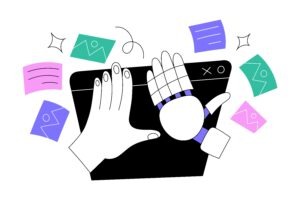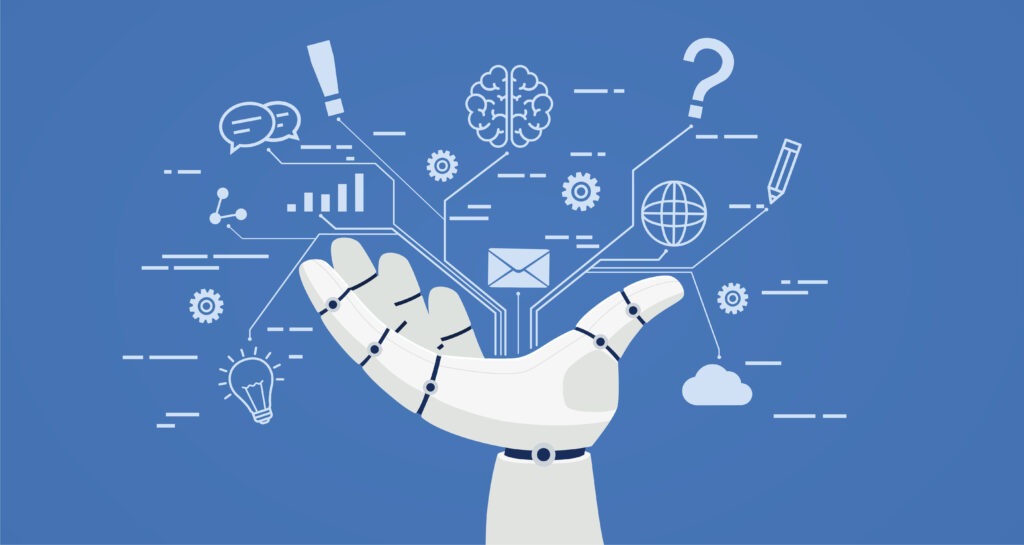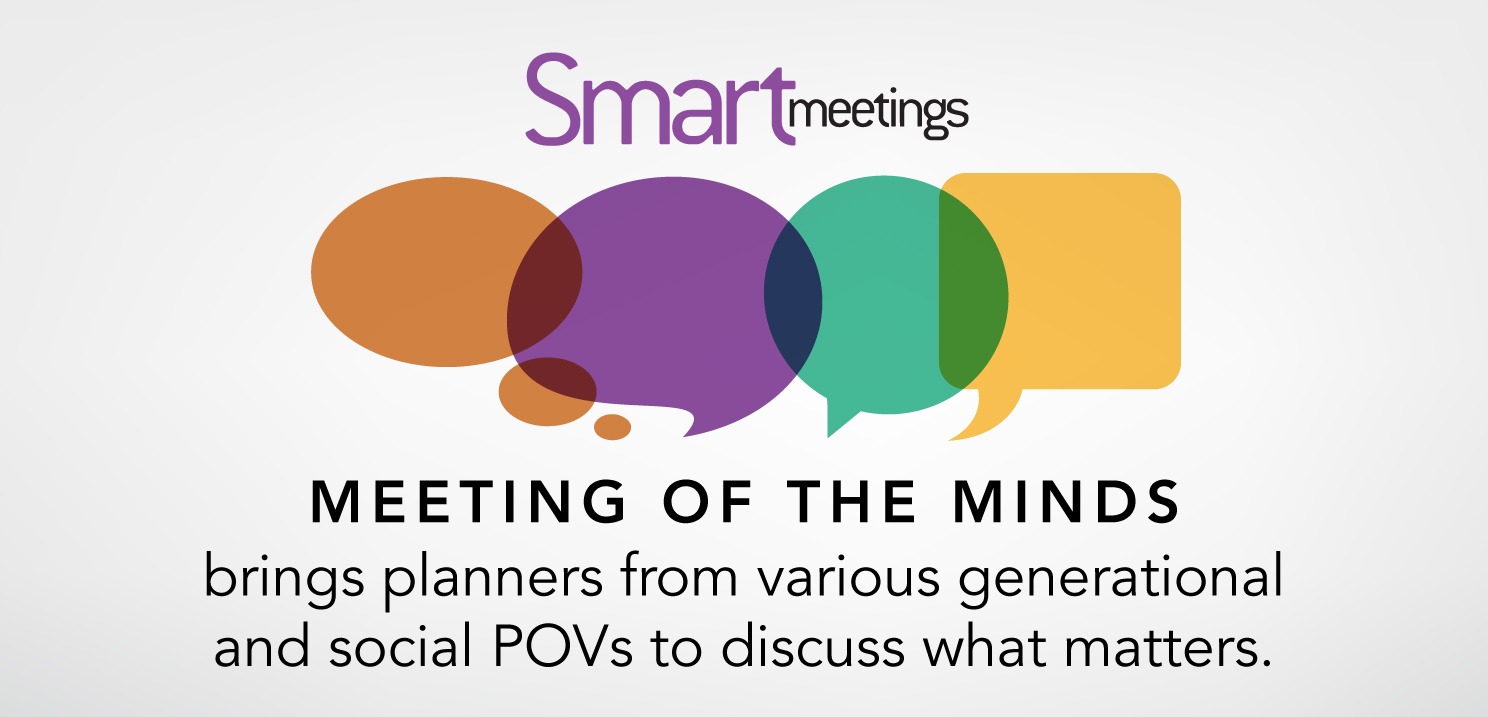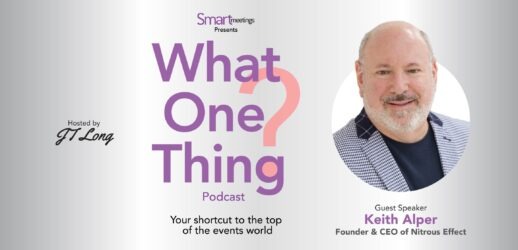How AI can benefit meeting planners
In this installment of Meeting of the Minds, Smart Meetings sat down with Janette Roush, executive vice president of marketing and digital for New York City Tourism & Conventions, and Sindhu Srivastava, CEO of We Crush Events and Meaningful Data, and a trained data scientist.

Smart Meetings Let’s get into the idea of what AI is, specifically for the people who plan meetings and events. How do you feel that the events industry can use AI in a way that works for everyone?
Sindhu Srivastava Predictive models have been around for a very long time. They basically work on the principle that if there are a bunch of input parameters, the model can predict the outcome, defined by a certain function—that is, the set of rules that defines the output.
The AI that’s taking the world by storm right now is large language models. Think about all the books that have ever been written, all the papers that have been written. If you knew all of that, and were able to stuff it in your head, would you be able to intelligently answer any question? So literally, what a large language model is doing is just trying to predict the next little bit in the answer. And it predicts, and it predicts, and if it can chain a bunch of right predictions together, they can make sense. Essentially, think of it as a very large amount of data that is stuffed into a series of models predicting answers.
Read More: Why AI Might Mean Salvation for the Meeting Industry
If you say, how can AI help people out there in the world today? You’re walking along the road, you have a question—not just a search engine question, but a question that requires looking at a bunch of websites, correlating information and putting a reasonable answer together. You go into the AI, you type your question, and it puts out the answer.
A question might be like, “I have a dental conference that I need to plan, so I need to understand what dentists care about and how dentists like to be entertained.” So essentially, now this AI model that has a bunch of data can find out a little bit about dentists, see what they care about, what seems to be their topics of interest and how they like to be entertained, and it can put together a thoughtful note for you. That can then act as your input into your conference that you’re hosting for these dentists. This is what AI is going to bring to the table from an event perspective.
 SM Jeanette, you’re interested in large language models and helping planners understand how to use them. Based on what Sindhu has explained, what are further ways that planners can use large language models?
SM Jeanette, you’re interested in large language models and helping planners understand how to use them. Based on what Sindhu has explained, what are further ways that planners can use large language models?
Jeanette Roush Let’s remember, it’s somewhat miraculous that access to these tools is really democratized. Like for free, we get access to stuff that would have been unimaginable 10 years ago.
I like to think about it both from a top-down approach and a bottom-up approach. The bottom-up approach is the planner, as an individual contributor to their organization.
It gives a planner the opportunity to just simply save 5% of their time, over the course of a quarter. Find the small ways that you can use a tool, like to rewrite a sentence or to write an email that you just can’t quite figure out.
There are lots of use cases, just for individuals. For example, that could be coming up with creative ideas for a breakout session. Could you imagine putting together a Dungeons and Dragons style breakout session? You could go to AI and say, “I’m going to have 30 people in this breakout, and I want them to play a role playing game. This is what I want people to learn. Come up with character sheets for each participant.” This is the kind of thing that you could have done before, but how many weeks would you spend writing this stuff? You could play around with this in an afternoon and see if there’s something you want to move forward with or not.
On the other side, it’s a top-down approach. For business event planners who are like Sindhu, running your own companies, needing to think as an organization, what do you need to think about when it comes to generative AI? Because NYC Tourism + Conventions is a nonprofit, our mission is to spread the vibrant adventure of New York City around the world and to drive economic prosperity for our members and for our residents. So, what are the ways that generative AI can help make that easier? What are the policies your company needs to put in place?
SM Are there any things that you have done with AI that can help improve events and make it better and easier for people to host events?
SS Running an events company, almost everybody at my company is in sales. A lot of times, we have to bring certain imagery in front of our clients. ChatGPT has DALL-E, which is image generation. We can say, “Show us a corporate event where people are experiencing joy.” And then you can actually have an image of a bunch of joyful looking people that you can use to say, “Here’s what an event can look like.” So, you can almost use AI models to generate what you want your clients to envision.
As the CEO it is my job to be the vision for We Crush Events. I have to pitch what this company can do with connecting people and what connecting people really means. I make a bunch of presentations, and I use Beautiful.ai and make a VC level deck over two days. And obviously, there was a lot of human intervention and more, but it gave me a starting platform. As a business owner running an events company, it gives you assistance that you didn’t know you needed, and damn good assistance.
JR I’ve been on a couple of panels with Matt Murnane, who is a co-founder of Slate Events, and he talks a lot about RFID data for events. If you are collecting this information of who goes into which sessions, and then what time they leave those sessions, through RFID data, then you’d have this really rich database. To be able to take that data and upload it into a tool like ChatGPT, the paid version allows you to attach spreadsheets, and then will analyze them using Python. We can, very quickly, just using regular language, ask questions of this dataset, like, “Were there any sessions where a mass of people, like more than 5% of the audience, left at a certain moment?” You can start to really dig into details and find the patterns in that data. If it’s just you [without AI], that could take hours.
SM From what you both are saying, AI can take a task that would have taken a human hours, days or even weeks to complete and do it in a very efficient amount of time, and that has to do with analyzing data. Sindhu, can you speak more about how AI works with data? Specifically, can you explain how you use your other company, Meaningful Data and data driven business solutions, to advance We Crush Events?
SS Business generates a ton of data. The magic comes through when that data means something. The core of any business is to generate a return on invested capital. So as a business owner, you’re constantly thinking of how to maximize return on invested capital. One way to generate higher return on invested capital is to analyze the data of a business and look for the optimizations.
To pay an executive admin to research that is very expensive. What would have taken that executive admin maybe a week and 40 hours of work, ChatGPT is now able to do for me in a couple of hours, so it becomes a very inexpensive solution. That means, as a business owner, you’re now using your executive admin resources to do something very different. For example, my executive admin does not research stuff for me. In fact, she files a lot, and there are lots of supplier diversity profiles that she’s constantly monitoring and applying. It’s about taking her investment as a resource and taking it to the next level, and then generating that return on invested capital.
SM When you use AI, you’re working with an entity that’s not human, has no emotions, has no feelings, essentially. And for events, it’s all about meeting people and making a connection. Is it weird to work with something that doesn’t have that? And how do you translate that into the event itself?
SS I have a little bit of a mixed bag of emotions about this. And I’ll tell you why. There’s a very famous story about a woman in an elderly care situation who was given a robot doll. And she would actually prefer spending time with her robot doll over and above visits from her grandchildren. For human beings, emotion is all about how we are feeling. Any one of us has watched a good movie knows whatever we’re seeing is not real, but we cry like crazy. There’s something that triggers emotion within us, and it’s not what’s on the outside, it’s who we are on the inside. For me, I don’t care whether AI feels—the question is, can AI make you feel? There are emotions that can get triggered based on what you’re seeing with AI.
Now, human beings are, are fundamentally designed to have human connections. But I don’t know whether those emotions can be substituted [in AI]. I think we’re still waiting to find out. I work with AI pretty much on a daily basis. And I can tell you, I’m smarter than it. I don’t mean that I can answer all the questions it can. But I can always find something additive that takes it to the next level, that I can contribute. The equation is not AI or me. It’s either AI, or AI plus me. There is no just me anymore, because I control the AI. And AI plus me is always going to be better than AI itself. Most human beings don’t have to make that choice of competing with an AI. Just get smarter than the AI and make it work for you.
JR Ethan Mollick writes about this a lot, the “jagged frontier.” Yes, start using it every day so that you can see the things that it is good at and the things that it is terrible at—and there are plenty of things its terrible at. The jagged frontier says that you find out it’s terrible at writing music, but it’s great at writing copy for this particular use case. We, as the human, learn how to insert ourselves into that frontier so that we can use it to help us for things it’s good at, and we know not to use it for things it’s not good at yet.
SM In terms of learning how to use AI, where would a meeting planner start?

JR This is what I actually did in January of 2023. I said, “I’m going to keep this open in a browser window on my computer. And every single day, I’m going to test some new work thing in ChatGPT. And I’m going to learn something: whether it works or it doesn’t work.”
By the end of January, I had a really good working knowledge of where that jagged frontier was—what it’s good at what it’s not good at. And then that gives you the baseline to build on. So, pick one of these three models, ChatGPT, Google’s Gemini product or Anthropic Claude. Play with it every single day and track what you’re learning through that entire process. And then at the end of a month, pick one of the models and get the paid version. Because truthfully, you are not experiencing generative AI if you are only using the free version of these models. At the most expensive, if you’re on a ChatGPT team account, paying by the month, it would be $30 a month. Everybody [reading] this is worth the investment of $20 to $30.
SS Janette brings up a really, really good point of practice. I want to take it one step further, which is again, look at what is a time-sucker in your day. If the time-sucker in your day is that you need to research on a topic and find out all about it, think, “How can I replace that bit of it with one of the AI tools?” If you’re making a whole bunch of slides, go use Beautiful.ai, and it will generate a lot of AI slides for you. If you write, start with Grammarly AI. Find what you’re working on and just do a critical few. Don’t try to do everything.
SM Do you have any concerns in regard to how people can abuse this service in a way that could have a negative impact? Are there any issues that you are seeing, or even any that could come up in the future that you are mindful of?
SS I’m going to recommend a really practical approach to paranoia. It is true that AI can do many bad things. But I’m not going to spend my day-to-day worrying intensely about it, because I have a job to do. Instead of spending time worrying, go use that time to learn, educate yourself and do stuff with yourself.
SM How can we be responsible with AI?
SS You should not be typing anything personal and sensitive into AI. There are things that you need to protect, because it could come out elsewhere. Don’t put anything that you would not want the public to hear from you.
JR If you’re looking in these systems from a company perspective, you need to review the privacy policies of whichever partners you’re bringing in. If you look at the ChatGPT products, they have an enterprise product and then a product for smaller enterprises, which is ChatGPT Team. So that’s soft to compliant, which means, in theory, it will be more difficult for something that you put into it to pop out somewhere else, but that’s where your security teams at your organization need to do an audit and determine the safest path forward.
I would refer people to guidelines that the city of Boston put out last May. They created a whole document that the CTO for the city sent by email to every single city employee, and then they posted this online. Essentially, it just laid out three rules. Don’t put in proprietary or confidential information. Be transparent about when you are using AI in your work; part of that is, that’s how we help each other learn. And, you have to be responsible in checking your own work; you have to keep the human in the loop. Their example is, if autocorrect changes a word in your email before you hit send, and you don’t catch it, but changing that word changes the meaning of your email, you’re still responsible for the email. It’s the same thing with anything that is generated; if you put it out in the world, you are responsible for what it says.
SM: If you were to talk to a planner who’s not convinced about using AI, what would be your pitch be?
JR For somebody who isn’t sure if it’s worth getting started, just get the free version and keep it open and just try a little thing in it. Many people get started with just writing a poem. Because this is an algorithm, and algorithms are good at putting things into order, and into frameworks. If you have kids, get it to write a bedtime story about their favorite toy, or write a haiku about that toy. Just find little examples of something that is meaningful for you.
Read More: AI: What is it Good for Anyway?
I just ran a half marathon a couple of weeks ago. I’ve done a lot of that, but my fiancé hasn’t. So, we used it to put together a training program. We described what our current workout situation was, and we had 12 weeks [until the half marathon] What do we need to do each week? This is something that’s of interest to me, so I was curious about exploring it with generative AI. Find the thing that is kind of interesting to you, and then use generative AI to explore that a little more deeply.
SS I want to say that a planner should be asking themselves, “What’s in it for you?”

If you look at your day, and you’re scratching your head around coming up with ideas for 10 breakout sessions, and you’re like, “How am I gonna get through this?” Go use ChatGPT. It’ll basically create those 10 ideas for you that’ll at least take off the starting inertia that we all feel. So start there, and once it starts producing value in your life, then you’re gonna be like, “Yeah, I’ve got this.” It’s like having your own assistant. So, I would say, find that mundane task that you absolutely hate, that ChatGPT or the some other AI can do, and go use it and try to create value for yourself.
SM In about five to 10 years, maybe even 20 years, where do you hope to see AI go in the events industry?
JR In five years, let me never send out a meeting invite again! I really need AI to just make calendar appointments happen. I know there are tools that use AI that help with that. What I need is for every single human being’s computer to be connected into something that just automatically, if a meeting needs to get moved, move those meetings around so that the right people can be together in the room at the right time. I think that would be the most valuable thing on earth.
And if that doesn’t happen, I don’t think that the future of AI is going to be personal. It’s going to be whichever chatbot that we like the best that lives inside our phone. This isn’t necessarily what’s happening today. But I think in a year, in three years, that AI is going to get to really know us.
It’s going to know my calendar is free, you know, in early August, and so is my fiancé’s and we like to go to beach destinations with our stepkids, and it knows that I like to watch TikToks to learn about things and it could probably generate three different TikTok type videos showcasing three different beach destinations that would be available for the dates that I am free that would also appeal to the kids. I think that kind of thing is absolutely possible with this type of technology. So, I’m excited to see if that’s the direction it goes in.
SS In terms of where I want AI to be five years from now, I want it to do two things. I’ve just described how all of us have racism, sexism, any -ism embedded in us, we all have those thoughts. But then, it’d be lovely if we had some sort of an AI tool that, whenever we came up with something racist, or sexist, it’ll help us catch ourselves as we’re in the middle of the act. Especially at a conference—I come from this land called Andhrapradesh, back in India, and the other day [at a conference] a very big actor comes on the stage, he shakes hands with every man on the stage and leaves all the women!
Somebody tells him what he’s just done, so he comes back on the stage, and he’s like, “I’m so sorry.” And then he goes and shakes the hands of the women [laughing]. Like, if my watch could have some listening ears, or my Alexa could have some listening ears, and just listen to the conversation around and say, “Okay, that was just racist or sexist towards you.” It’ll help us wake up. I want my children to wake up. So that would be one wish for me.
The second wish I have is this: I feel like, as human beings, all of us have, a certain amount of stress, fear, anxiety. All of us, when we get angry, behind that anger is really feeling. We’re so afraid of something that we use anger to mask it. And I feel like it’s not very well understood.
I just wish again, that there would be this device that would tell us whether we’re sabotaging ourselves, as XXX of Positive Intelligence would say, or whether we’re acting from our sage powers, which is the passion, motivation, solution-orientedness that we all have; curiosity, innovation, like everything that he says are sage powers. Like, “self-sabotage, self-sabotage, sage, sage, sage.” I would really like this whole world, because I feel like so much talent is being wasted, just because we get caught up in our own drama. I think we’d have a much happier world.
Listen to the entire podcast with Roush and Srivastava here.
A shortened version of this interview appears in the May 2024 issue. You can subscribe to the magazine here.




